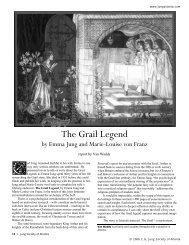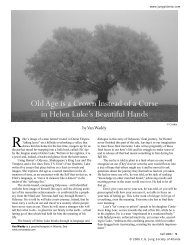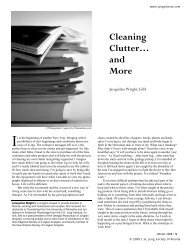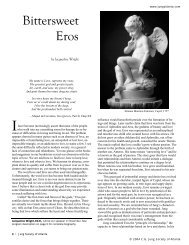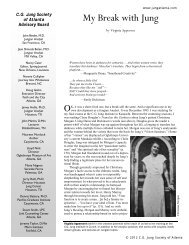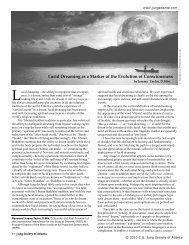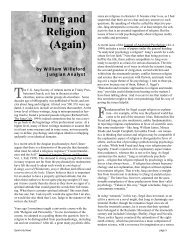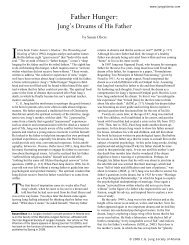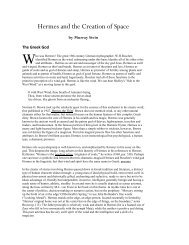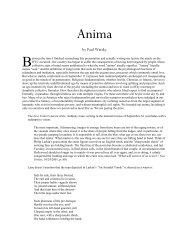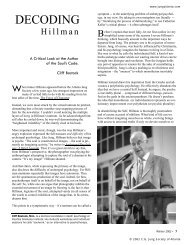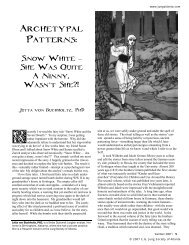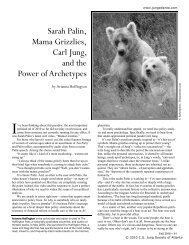Tears: Connection to the Source - C.G. Jung Society of Atlanta
Tears: Connection to the Source - C.G. Jung Society of Atlanta
Tears: Connection to the Source - C.G. Jung Society of Atlanta
You also want an ePaper? Increase the reach of your titles
YUMPU automatically turns print PDFs into web optimized ePapers that Google loves.
When does our environment permit our eyes <strong>to</strong> flow over? We<br />
allow babies <strong>to</strong> weep, although <strong>the</strong>y are incapable <strong>of</strong> shedding<br />
tears until <strong>the</strong>y are a few weeks old. People may cry at funerals<br />
– women avail <strong>the</strong>mselves <strong>of</strong> <strong>the</strong> opportunity much more so than<br />
men. The brevity and matter <strong>of</strong> fact spirit <strong>of</strong> our funeral rites<br />
seems intended <strong>to</strong> stem <strong>the</strong> emotional outpouring <strong>of</strong> <strong>the</strong> bereaved<br />
ra<strong>the</strong>r than provide a safe container, a temenos, which<br />
would give space, dignity and respect <strong>to</strong> emotion. People are<br />
allowed <strong>to</strong> cry when <strong>the</strong>ir bodies are wounded, when <strong>the</strong>re is<br />
concrete pain. Men are more bereft <strong>of</strong> emotional expression<br />
than women when it comes <strong>to</strong> cultural permission <strong>to</strong> cry: <strong>the</strong>y<br />
make up <strong>the</strong> invisible, silent columns <strong>of</strong> tearless walking<br />
wounded.<br />
W<br />
e have a newcomer on our street: a single man who<br />
moved in<strong>to</strong> our neighborhood a couple <strong>of</strong> years ago.<br />
After he had been here for almost a year his fa<strong>the</strong>r<br />
died. A friend and I went <strong>to</strong> <strong>the</strong> funeral service. There were<br />
eulogies and testimonies <strong>to</strong> <strong>the</strong> deceased. His nephew, a handsome,<br />
bright young man delivered a speech. As he talked about<br />
his grandfa<strong>the</strong>r’s life, tears started <strong>to</strong> come and his words faltered.<br />
He acknowledged his state <strong>of</strong> disequilibrium but continued<br />
<strong>to</strong> talk movingly about his grandfa<strong>the</strong>r. His tears were not<br />
only evidence <strong>of</strong> <strong>the</strong> strong emotional ties between <strong>the</strong> two men,<br />
but as <strong>the</strong>y spilled over, despite his efforts at control, all <strong>of</strong> us<br />
now belonged, mysteriously, with <strong>the</strong> grieving – sharing a pr<strong>of</strong>ound<br />
and deeply human condition: no one was alone any<br />
longer; his healing tears bridged <strong>the</strong> distance between us and<br />
washed away <strong>the</strong> <strong>of</strong>ten unbearable sense <strong>of</strong> isolation and loneliness.<br />
Afterwards, a few weeks later, my neighbor and I talked<br />
about <strong>the</strong> funeral. He calmly commented on his nephew’s display<br />
<strong>of</strong> emotion as inappropriate, showing weakness and something<br />
that should have been prevented.<br />
Men have generally been condemned <strong>to</strong> a brittle, tearless life –<br />
women may cry, but <strong>of</strong>ten we carry <strong>the</strong> burden <strong>of</strong> our men’s<br />
unshed tears as well; we are considered weak when we allow<br />
our tears <strong>to</strong> flow. We are chided, even ridiculed for our emotional<br />
connectedness. Americans seldom welcome tears or <strong>the</strong><br />
hurt and sadness we usually associate with <strong>the</strong>m. Of all <strong>the</strong> emotions<br />
we are capable <strong>of</strong>, we split <strong>of</strong>f a mass <strong>of</strong> <strong>the</strong>m. We know<br />
we have a right <strong>to</strong> happiness – it says so in our Constitution. But<br />
where has our right <strong>to</strong> sadness and its wet companions gone?<br />
For that matter where are anger, worry, fear, envy, jealousy and<br />
all <strong>the</strong> o<strong>the</strong>r dark sisters and bro<strong>the</strong>rs when we look at all <strong>the</strong><br />
guests invited <strong>to</strong> our brightly lit and well-adjusted lives? The<br />
collective allows for a severely limited emotional range – anything<br />
outside this “healthy”, narrow band <strong>of</strong> smiley-faced dryness<br />
may even be labeled pathological and must lead a secret<br />
life, closeted away. Psychologically this is a dangerous situation.<br />
Whatever lives in <strong>the</strong> closet – ano<strong>the</strong>r word for <strong>the</strong> unconscious<br />
– develops a shadow life <strong>of</strong> it’s own, binds psychic energy, limits<br />
our creativity and is likely <strong>to</strong> erupt in<strong>to</strong> our lives with archaic,<br />
usually malevolent force. Like <strong>the</strong> thirteenth fairy in “Sleeping<br />
Beauty”, inner figures only become dangerous when <strong>the</strong>y are<br />
not invited. (Happens all <strong>the</strong> time <strong>to</strong> us when we are overlooked<br />
for invitations <strong>to</strong> parties, for promotions, in conversation etc.)<br />
Psychologically speaking, <strong>the</strong>se inner figures become repressed<br />
or suppressed content, captives <strong>of</strong> a host <strong>of</strong> defense mechanisms.<br />
We know, for example, that unshed tears can lead <strong>to</strong> unmanageable<br />
hysteria or a soulless, arid wasteland in <strong>the</strong> psyche and dis-<br />
6 • <strong>Jung</strong> <strong>Society</strong> <strong>of</strong> <strong>Atlanta</strong><br />
www.jungatlanta.com<br />
Pablo Picasso - Weeping Woman, 1937<br />
owned anger can readily turn in<strong>to</strong> violent rage and aggression. I<br />
want <strong>to</strong> be clear that I am not advocating acting out: quite <strong>the</strong><br />
contrary. By becoming conscious <strong>of</strong> our emotions our egos have<br />
<strong>the</strong> only chance <strong>of</strong> any control and humanizing interaction. On<br />
<strong>the</strong> level <strong>of</strong> diplomacy: if two countries break <strong>of</strong>f communications,<br />
sadly, war is only <strong>to</strong>o <strong>of</strong>ten <strong>the</strong> consequence.<br />
T<br />
he fountain <strong>of</strong> tears is grounded in wounds based on<br />
losses such as loss <strong>of</strong> innocence, persons, jobs, hopes,<br />
youth, health etc. But wounds also constitute openings<br />
<strong>of</strong> <strong>the</strong> surface. They provide a salty access road <strong>to</strong> what is more<br />
than skin deep. <strong>Jung</strong>ians understand life through images –<br />
whe<strong>the</strong>r <strong>the</strong>se images present <strong>the</strong>mselves in dreams or during<br />
waking hours. These images, unders<strong>to</strong>od as symbols, establish a<br />
connection between consciousness, <strong>the</strong> house <strong>of</strong> <strong>the</strong> ego, and <strong>the</strong><br />
deeper layers <strong>of</strong> <strong>the</strong> personal and/or collective unconscious,<br />
home <strong>of</strong> <strong>the</strong> complexes and archetypes. Libido, precious life<br />
energy, is rooted in and wells up from <strong>the</strong> unconscious. That is<br />
why we so need <strong>to</strong> have communications and creative interplay<br />
between <strong>the</strong>se two psychic spheres. Much <strong>of</strong> our life energy is<br />
tied up with <strong>the</strong> shadow - personal as well as collective - and is<br />
out <strong>of</strong> eyesight. Following our individual trail <strong>of</strong> tears, allowing<br />
feelings <strong>to</strong> bubble up in<strong>to</strong> consciousness, is <strong>the</strong> only chance we<br />
have <strong>of</strong> avoiding <strong>the</strong> destructive, shadowy aspect <strong>of</strong> emotions.<br />
We are afraid <strong>of</strong> emotionality in many Western societies, but<br />
especially so in <strong>the</strong> United States: it is messy and any messiness<br />
bugs us. Americans are well known for <strong>the</strong>ir penchant for disinfectants,<br />
antibiotics, bug sprays etc. Murky depths, things we do<br />
not understand, unpredictable confusion, mystery … most <strong>of</strong> us<br />
prefer not <strong>to</strong> be surprised or confused by and about most things.<br />
We ascribe <strong>to</strong> a risk free life, a relatively manageable, mess-free,<br />
easy, if passionless life. We have no patience for walking along<br />
any bluesy, dismal road. We insist on living almost exclusively<br />
on <strong>the</strong> sunny side <strong>of</strong> <strong>the</strong> street. It is not unusual that it can take<br />
© 2002 C.G. <strong>Jung</strong> <strong>Society</strong> <strong>of</strong> <strong>Atlanta</strong>



